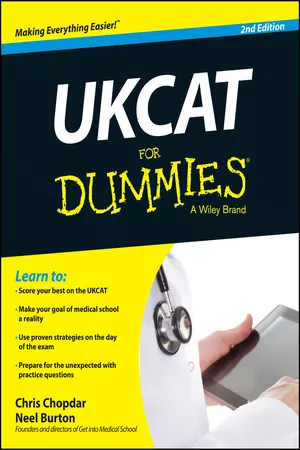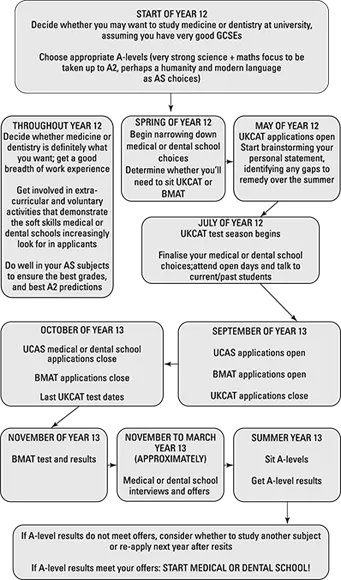
- English
- ePUB (mobile friendly)
- Available on iOS & Android
eBook - ePub
UKCAT For Dummies
About this book
Fully updated to include the review materials and practice you need for the new Situational Judgment Test
The expert advice, instruction, review and practice students need to score high on the UKCAT. If you're planning on applying to medical or dental school, the new edition of UKAT For Dummies provides a proven formula for success. It's packed with practice questions, in-depth answers, and strategies and tips for scoring well on each of the test sections, including the Situational Judgment Test and the new question types introduced for the Verbal Reasoning and Abstract Reasoning test sections.
Tools to learn more effectively

Saving Books

Keyword Search

Annotating Text

Listen to it instead
Information
Part I
Understanding UKCAT

In this part …
- Decide whether a career in medicine or dentistry is for you.
- Understand what the UKCAT is designed to test.
- Understand how the test is structured, and get the low-down on the various sub-tests.
- Find out how to apply to take the UKCAT.
Chapter 1
The UKCAT and University
In This Chapter



You can easily drift into a career without really thinking about whether it’s right for you. This chapter explains what medicine and dentistry are like as careers, and what role the United Kingdom Clinical Aptitude Test (UKCAT) plays in the application process for these courses.
Looking at the Lifestyle
Getting into university to study medicine or dentistry is tough. Doctors and dentists are some of the most respected members of society. Medical and dental jobs retain an air of glamour and mystique in the eyes of the general public. And although the reality is often more challenging and more pedestrian than the fantasy of medical dramas, these careers do have some unique benefits.
As a doctor or dentist, you earn extraordinary privileges. As well as receiving an excellent grounding in the sciences, you develop your communication skills, sharpen your deductive skills, and discover all sorts of intimate details about complete strangers along the way.
Medicine and dentistry are two of the few professions where you can incorporate both science and art into your daily working life. A career in medicine or dentistry comes with more job security than most jobs provide, along with an historically comfortable salary.
If you still want to apply to medical or dental school, you need to overcome one of the toughest university degree application systems. Things weren’t always so complicated. When we started out, all we needed was a bit of relevant work experience, solid A-level predictions, and the ability to sound intelligent and vaguely enthusiastic in an interview. If you applied to Oxford, you needed to navigate the little matter of the Oxford Entrance Exam, but if you performed well, you got a two Es offer: as long as you got two Es on your A-levels, you were in!
Barriers to admission are far higher today. To be accepted as one of tomorrow’s doctors or dentists, you have to show intelligence and initiative, communication skills and commitment, and resilience and reliability. You need to demonstrate both breadth and depth of work experience, take part in significant extracurricular activities, have excellent AS results and A-level predictions, be prepared to take on large tuition fees with their associated loans, be naturally talented and have practised enough to perform well in the extra exams that universities make you sit, such as the BioMedical Admissions Test (BMAT) and the United Kingdom Clinical Aptitude Test (UKCAT).
This increasing complexity isn’t due only to more people applying for courses. The situation is also because universities increasingly struggle to distinguish between good and great candidates on the basis of A-level predictions and results alone. We wait to see whether the recent introduction of the A* grade shifts the balance back to A-level results, but currently many universities consider good UKCAT scores vital. Because university admissions policies tend to change particularly slowly, there may be an organisational inertia against streamlining entrance requirements for fear that doing so would lead to a reduction in the quality of applicants to the best universities. Therefore, UKCAT is likely to remain a key part of the selection procedures for the foreseeable future.
We often hear first-hand how worrying the UKCAT is to candidates. The good news is that with preparation, you can improve your eventual performance markedly. In this book we aim to help you do just that.
Applying to Read Medicine or Dentistry
If you’ve weighed the pros and cons of a career in medicine or dentistry and decided it’s what you really want, you need to know exactly how to go about it. The application process is long, and it starts early.
Use this section as a jumping-off point to research the medical fields further. Our focus on the UKCAT in this book means that the information in this section is only introductory to the wider application process. For more detailed information, take a look at our related book, Get into UK Medical School for Dummies (Wiley).
Considering the timeline
In Figure 1-1 we show a rough timeline of when to do what if you want to apply to medical or dental school. Use the timeline to keep the big picture of the application process in mind.

Figure 1-1: Timeline for applying to medical or dental school.
Picking your A-levels
Unless you’re reading this book at a remarkably early stage, you’ve probably already chosen your A-levels. If you still have time to optimise your choices for medicine or dentistry, remember that chemistry is mandatory, and having biology really helps too. Many medical and dental applicants study physics or mathematics at A-level, but these subjects aren’t essential for getting into medical or dental school.
An increasing number of candidates sit more than three A-levels. Languages, psychology and business studies are popular options to help potential medical and dental students demonstrate their breadth of ability.
The choice is yours, but you need to expect to score highly in your...
Table of contents
- Cover
- Title Page
- Table of Contents
- Introduction
- Part I: Understanding UKCAT
- Part II: Examining the Subtests
- Part III: Practice Tests
- Part IV: The Part of Tens
- About the Authors
- Cheat Sheet
- More Dummies Products
Frequently asked questions
Yes, you can cancel anytime from the Subscription tab in your account settings on the Perlego website. Your subscription will stay active until the end of your current billing period. Learn how to cancel your subscription
No, books cannot be downloaded as external files, such as PDFs, for use outside of Perlego. However, you can download books within the Perlego app for offline reading on mobile or tablet. Learn how to download books offline
Perlego offers two plans: Essential and Complete
- Essential is ideal for learners and professionals who enjoy exploring a wide range of subjects. Access the Essential Library with 800,000+ trusted titles and best-sellers across business, personal growth, and the humanities. Includes unlimited reading time and Standard Read Aloud voice.
- Complete: Perfect for advanced learners and researchers needing full, unrestricted access. Unlock 1.4M+ books across hundreds of subjects, including academic and specialized titles. The Complete Plan also includes advanced features like Premium Read Aloud and Research Assistant.
We are an online textbook subscription service, where you can get access to an entire online library for less than the price of a single book per month. With over 1 million books across 990+ topics, we’ve got you covered! Learn about our mission
Look out for the read-aloud symbol on your next book to see if you can listen to it. The read-aloud tool reads text aloud for you, highlighting the text as it is being read. You can pause it, speed it up and slow it down. Learn more about Read Aloud
Yes! You can use the Perlego app on both iOS and Android devices to read anytime, anywhere — even offline. Perfect for commutes or when you’re on the go.
Please note we cannot support devices running on iOS 13 and Android 7 or earlier. Learn more about using the app
Please note we cannot support devices running on iOS 13 and Android 7 or earlier. Learn more about using the app
Yes, you can access UKCAT For Dummies by Chris Chopdar,Neel Burton in PDF and/or ePUB format, as well as other popular books in Study Aids & Study Guides. We have over one million books available in our catalogue for you to explore.


